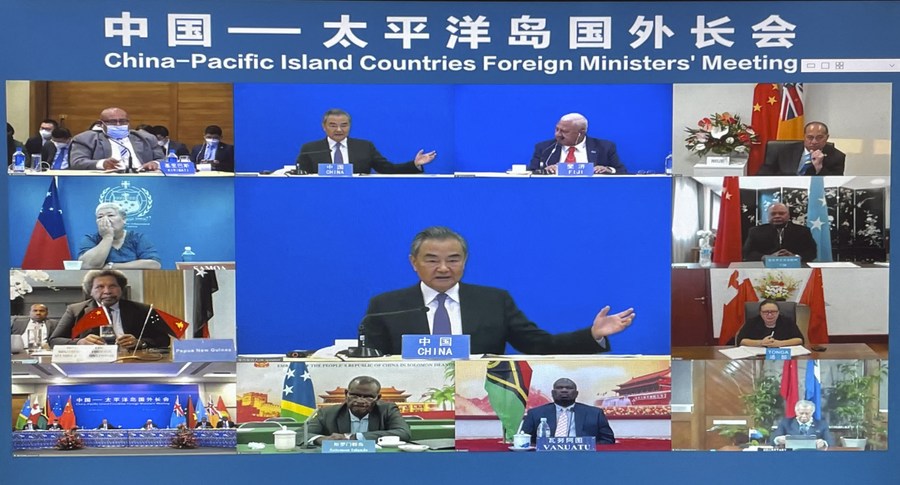
Chinese State Councilor and Foreign Minister Wang Yi (L) meets with Pacific Islands Forum (PIF) Secretary General Henry Puna in Suva, Fiji, May 29, 2022. [Photo/Xinhua]
By Stephen Ndegwa
Currently on a 10-day tour of South Pacific Island countries and Timor-Leste, Chinese State Councilor and Foreign Minister Wang Yi stated something that needed to be said some time ago. During his fourth stop in Fiji where he met the country’s president Ratu Katonivere, Wang Yi said that China’s successful development is a joint partnership with developing countries.
Most noteworthy is his promise that the second largest economy in the world was looking out for the Global South by ensuring that the social and economic interests of poor countries are protected. True to his words, the Chinese FM’s tour is taking place in a region that developed countries as a whole are generally loath to visit since they believe the area is of no strategic value to their designs.
Well, everyone loves a hero, and China just happens to fit the bill. Like a moth to a flame, the developing world is readily embracing holistic partnership with the economic powerhouse. It is not by accident or through coercion, which is the modus operandi of those that seek dominion over others.
China’s humility is exemplary. In its view of the world, there is no country that is so insignificant it does not warrant a fully-fledged partnership. It is unfathomable for a leader of the Western world to take a visit to the countries on Wang Yi’s current itinerary. In the West’s thinking, the Pacific Island countries are ideally “primitive” locations for holiday-makers and Hollywood movies, rather than for serious inter-governmental relations.
Wang Yi’s humble statement in Fiji was characteristic of China’s modesty amid the power in its possession today. The country is pivotal in easing the problems of the so-called third world countries in a cost effective manner through long-term modern infrastructural and technological support. The country has also stood in various gaps that have been previously covered by developed economies. It is estimated that during the COVID-19 crisis the country’s economic growth girded the global economy by an estimated 30 percent.
As a founding and powerful member of the United Nations, China has expressed the desires of developing countries in various international forums on issues that range from economic development, poverty alleviation and health care, to food security and environmental protection. As a developing country, China's arguments and dealings at the UN are naturally representative of the Global South's interests.

Chinese State Councilor and Foreign Minister Wang Yi (center) co-hosts the second China-Pacific Island Countries Foreign Ministers' Meeting with Fijian Prime Minister and Foreign Minister Josaia Voreqe Bainimarama in Suva, capital of Fiji, May 30, 2022. [Photo/Xinhua]
Wang Yi noted that China’s continued growth and development means that it will have more resources to look after developing countries' legitimate rights and interests more effectively in the international arena. China’s continued development has enhanced its contribution in the UN, and revitalized and motivated other developing countries.
The strong bond and common development with the Global South has been made possible through what Katonivere referred to as China’s "selfless support and help." Over time, the partners have engaged in activities that have strengthened mutual trust and support, and enhanced solidarity. It is a friendship whose sincerity runs deep after undergoing several tests.
For instance, the country has shown that it does not abandon its friends during times of dire need, like in the last couple of years when COVID-19 ravaged the world. While developed countries from the West engaged in vaccine apartheid and even treated some of their own as second-class citizens, China reached out to every nook and cranny around the world with various donations to help fight the pandemic.
China is a child of two worlds. It belongs to major economies in the world, but is still a developing economy. Therefore, it views issues using a wide lens, which enables it to discern the impact of developments across the global spectrum and offer practical solutions in tackling them. Developing countries need concrete projects that work, and not theories that confuse and even worsen their situation.
It behooves developing countries to jealously protect their partnership with China in order for them to continue benefiting from the country’s constantly growing economic success and global influence. Indeed, the Global South must stand in between the country and the forces that Wang Yi noted were hell-bent on ensuring that it does not prosper by delaying or even interrupting its development.
China is undoubtedly an inspiration to the developing world. It has overcome seemingly insurmountable odds to not just become the second largest economy within an unprecedented short span of time compared to its contemporaries, but also become the first country to eradicate extreme poverty.
It is driven by the desire to see other countries prosper, for that is also the only way it can have able partners who can utilize projects like the Belt and Road Initiative to spur trade and development. With the Global South the next frontier of global economic growth, China has its hands full. It is a responsibility thrust on it by the shifting geopolitical trends and circumstances.
Stephen Ndegwa is a Nairobi-based communication expert, a lecturer-scholar at the United States International University-Africa and an author and international affairs columnist.

 中文
中文



